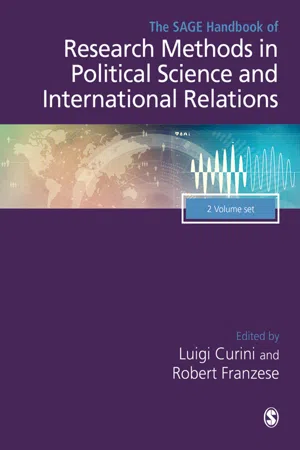
The SAGE Handbook of Research Methods in Political Science and International Relations
- 1,332 pages
- English
- ePUB (mobile friendly)
- Available on iOS & Android
The SAGE Handbook of Research Methods in Political Science and International Relations
About this book
The SAGE Handbook of Research Methods in Political Science and International Relations offers a comprehensive overview of research processes in social science — from the ideation and design of research projects, through the construction of theoretical arguments, to conceptualization, measurement, & data collection, and quantitative & qualitative empirical analysis — exposited through 65 major new contributions from leading international methodologists.
Each chapter surveys, builds upon, and extends the modern state of the art in its area. Following through its six-part organization, undergraduate and graduate students, researchers and practicing academics will be guided through the design, methods, and analysis of issues in Political Science and International Relations:
Part One: Formulating Good Research Questions & Designing Good Research Projects
Part Two: Methods of Theoretical Argumentation
Part Three: Conceptualization & Measurement
Part Four: Large-Scale Data Collection & Representation Methods
Part Five: Quantitative-Empirical Methods
Part Six: Qualitative & "Mixed" Methods
Frequently asked questions
- Essential is ideal for learners and professionals who enjoy exploring a wide range of subjects. Access the Essential Library with 800,000+ trusted titles and best-sellers across business, personal growth, and the humanities. Includes unlimited reading time and Standard Read Aloud voice.
- Complete: Perfect for advanced learners and researchers needing full, unrestricted access. Unlock 1.4M+ books across hundreds of subjects, including academic and specialized titles. The Complete Plan also includes advanced features like Premium Read Aloud and Research Assistant.
Please note we cannot support devices running on iOS 13 and Android 7 or earlier. Learn more about using the app.
Information
Table of contents
- Cover
- Half Title
- Title Page
- Copyright Page
- Contents
- List of Figures
- List of Tables
- Notes on the Editors and Contributors
- An Introduction
- Foreword
- So You're A Grad Student Now? Maybe You Should Do This
- Part I Formulating Good Research Questions and Designing Good Research Projects
- 1 Asking Interesting Questions
- 2 From Questions and Puzzles to Research Project
- 3 The Simple, the Trivial and the Insightful: Field Dispatches from a Formal Theorist
- 4 Evidence-Driven Computational Modeling1
- 5 Taking Data Seriously in the Design of Data Science Projects
- 6 Designing Qualitative Research Projects: Notes on Theory Building, Case Selection and Field Research
- 7 Theory Building for Causal Inference: EITM Research Projects
- 8 EITM: Applications in Political Science and International Relations1
- Part II Methods of Theoretical Argumentation
- 9 Political Psychology, Social Psychology and Behavioral Economics
- 10 Institutional Theory and Method
- 11 Applied Game Theory: An Overview and First Thoughts on the Use of Game Theoretic Tools
- 12 The Spatial Voting Model
- 13 New Directions in Veto Bargaining: Message Legislation, Virtue Signaling, and Electoral Accountability
- 14 Models of Coalition Politics: Recent Developments and New Directions
- 15 Models of Interstate Conflict
- 16 Models of the Judiciary
- 17 Wrestling with Complexity in Computational Social Science: Theory, Estimation and Representation
- 18 Learning and Diffusion Models
- Part III Conceptualization and Measurement
- 19 Conceptualization and Measurement: Basic Distinctions and Guidelines
- 20 Measurement Models
- 21 Measuring Attitudes – Multilevel Modeling with Post-Stratification (MrP)*
- Part IV Large-Scale Data Collection and Representation Methods
- 22 Web Data Collection: Potentials and Challenges
- 23 How to Use Social Media Data for Political Science Research
- 24 Spatial Data
- 25 Visualizing Data in Political Science
- 26 Text as Data: An Overview
- 27 Scaling Political Positions from Text: Assumptions, Methods and Pitfalls
- 28 Classification and Clustering
- 29 Sentiment Analysis and Social Media
- 30 Big Relational Data: Network-Analytic Measurement
- Part V Quantitative-Empirical Methods
- 31 Econometric Modeling: From Measurement, Prediction, and Causal Inference to Causal-Response Estimation
- 32 A Principled Approach to Time Series Analysis
- 33 Time-Series-Cross-Section Analysis
- 34 Dynamic Systems of Equations
- 35 Duration Analysis
- 36 Multilevel Analysis
- 37 Selection Bias in Political Science and International Relations Applications
- 38 Dyadic Data Analysis
- 39 Model Specification and Spatial Interdependence*
- 40 Instrumental Variables: From Structural Equation Models to Design-Based Causal Inference
- 41 Causality and Design-Based Inference
- 42 Statistical Matching with Time-Series Cross-Sectional Data: Magic, Malfeasance, or Something in between?
- 43 Differences-in-Differences: Neither Natural nor an Experiment
- 44 The Regression Discontinuity Design1
- 45 Network Analysis: Theory and Testing
- 46 Network Modeling: Estimation, Inference, Comparison, and Selection
- 47 Bayesian Methods in Political Science
- 48 Bayesian Ideal Point Estimation
- 49 Bayesian Model Selection, Model Comparison, and Model Averaging*
- 50 Bayesian Modeling and Inference: A Postmodern Perspective
- 51 Laboratory Experimental Methods
- 52 Field Experiments on the Frontier: Designing Better
- 53 Field Experiments, Theory, and External Validity
- 54 Survey Experiments and the Quest for Valid Interpretation
- 55 Deep Learning for Political Science
- 56 Machine Learning in Political Science: Supervised Learning Models
- Part VI Qualitative and ‘mixed’ methods
- 57 Set Theoretic Methods
- 58 Mixed-Methods Designs
- 59 Case Study Methods: Case Selection and Case Analysis
- 60 Comparative Analyses of Foreign Policy
- 61 When Talk Isn't Cheap: Opportunities and Challenges in Interview Research
- 62 Focus Groups: From Qualitative Data Generation to Analysis
- 63 Interpretive Approaches in Political Science and International Relations
- Afterword
- Index